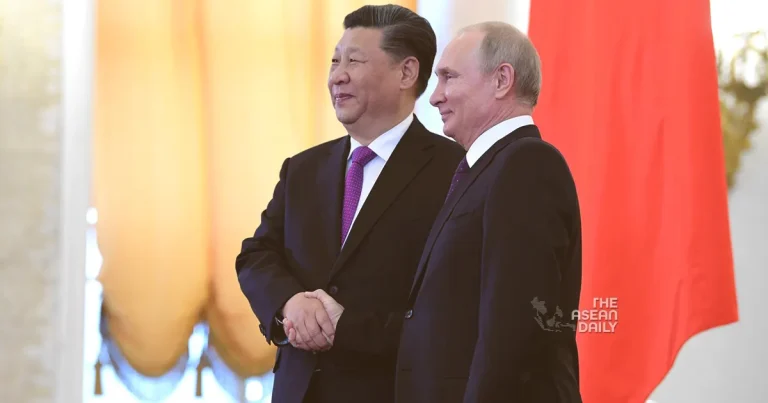16-5-2024 (BEIJING) In a symbolic display of unity between authoritarian allies, Russian President Vladimir Putin touched down in Beijing on Thursday for a two-day state visit to China. This pivotal trip comes as Moscow presses forward with a renewed offensive in Ukraine, underscoring the deepening ties between the two nations amidst the ongoing conflict.
As the dawn broke over the Chinese capital, an honour guard from the People’s Liberation Army, the armed wing of China’s ruling Communist Party, welcomed Putin upon his arrival. A brigade of military police on motorcycles escorted his motorcade into the city, setting the stage for a series of high-level meetings with his counterpart, Xi Jinping, and other top officials.
The discussions are expected to reinforce the “no limits” relationship that Russia and China signed in 2022, just before Russia launched its full-scale invasion of Ukraine. Since then, Russia has become increasingly economically dependent on China as Western sanctions have cut its access to much of the international trading system.
On the eve of the visit, Putin struck a conciliatory tone in an interview with Chinese media, stating that the Kremlin is prepared to negotiate over the conflict in Ukraine. “We are open to a dialogue on Ukraine, but such negotiations must take into account the interests of all countries involved in the conflict, including ours,” Putin was quoted as saying by the official Xinhua News Agency.
???????????????? Por invitación del líder chino, Xi Jinping, el Presidente de Rusia, Vladímir Putin, llegó a Pekín, iniciando su visita de Estado a la República Popular China.
Se trata del primer viaje al extranjero del mandatario ruso tras la toma de posesión.#RusiaChina pic.twitter.com/oZiON0uO4S
— Cancillería de Rusia ???????? (@mae_rusia) May 16, 2024
The Russian leader’s two-day trip comes as his country’s forces have pressed an offensive in northeastern Ukraine’s Kharkiv region, which began last week in the most significant border incursion since the full-scale invasion commenced, forcing almost 8,000 people to flee their homes. Coupled with Moscow’s efforts to build on its gains in the nearby Donetsk region, the 2-year-old war has entered a critical stage for Ukraine’s depleted military, which is awaiting new supplies of anti-aircraft missiles and artillery shells from the United States.
While Putin reiterated his openness to negotiations, he also emphasized Russia’s unwavering stance. “We have never refused to negotiate,” he was quoted as saying by Xinhua. “We are seeking a comprehensive, sustainable and just settlement of this conflict through peaceful means. We are open to a dialogue on Ukraine, but such negotiations must take into account the interests of all countries involved in the conflict, including ours.”
Ukrainian President Volodymyr Zelenskyy has previously stated that any negotiations must include a restoration of Ukraine’s territorial integrity, the withdrawal of Russian troops, the release of all prisoners, a tribunal for those responsible for the aggression, and security guarantees for Ukraine.
China claims to take a neutral position in the conflict, but has backed Moscow’s contentions that Russia was provoked into attacking Ukraine by the West, despite Putin’s public avowals of his desire to restore Russia’s century-old borders as the reason for his assault.
Putin has blamed the West for the failure of negotiations in the opening weeks of the war and praised China’s peace plan for Ukraine that would allow Moscow to cement its territorial gains.
“Beijing proposes practicable and constructive steps to achieve peace by refraining from pursuing vested interests and constant escalation of tensions, minimizing the negative impact of the conflict on the global economy,” he had said.
Putin said a Chinese proposal in 2023, which Ukraine and the West rejected, could “lay the groundwork for a political and diplomatic process that would take into account Russia’s security concerns and contribute to achieving a long-term and sustainable peace.”
The Kremlin said in a statement that during their talks this week, Putin and Chinese leader Xi Jinping will “have a detailed discussion on the entire range of issues related to the comprehensive partnership and strategic cooperation and determine the new directions for further development of cooperation between Russia and China and also have a detailed exchange of opinions on the most acute international and regional issues.”
Putin began a fifth term in office this month, underscoring the significance of his visit to Beijing as he seeks to strengthen ties with a crucial ally in the face of escalating tensions with the West.
In a speech to the upper house of the Russian parliament on Tuesday, Foreign Minister Sergey Lavrov emphasized the shared interests between Moscow and Beijing, stating that they are “objectively interested in maintaining our lead in efforts to establish a more fair and democratic world order.”
“Russia and China aren’t alone in their efforts to reform an international system and help establish a multipolar global order,” he said, adding that “the duet of Moscow and Beijing plays a major balancing role in global affairs.”
As the war in Ukraine drags into its third year, Moscow has forged increasingly close ties with Beijing, diverting the bulk of its energy exports to China and relying on Chinese companies to import high-tech components for Russian military industries, circumventing Western sanctions.
The Russia-China military ties have also strengthened, with the two nations holding a series of joint war games in recent years, including naval drills and patrols by long-range bombers over the Sea of Japan and the East China Sea. Russian and Chinese ground forces have also deployed to each other’s territories for joint drills.
China remains a major market for Russian military exports, while also massively expanding its domestic defensive industries, including building aircraft carriers and nuclear submarines.
Putin has previously acknowledged that Russia has been sharing highly sensitive military technologies with China, significantly bolstering its defense capabilities. In October 2019, he mentioned that Russia was helping China to develop an early warning system to spot ballistic missile launches – a system involving ground-based radar and satellites that only Russia and the United States possessed at the time.




